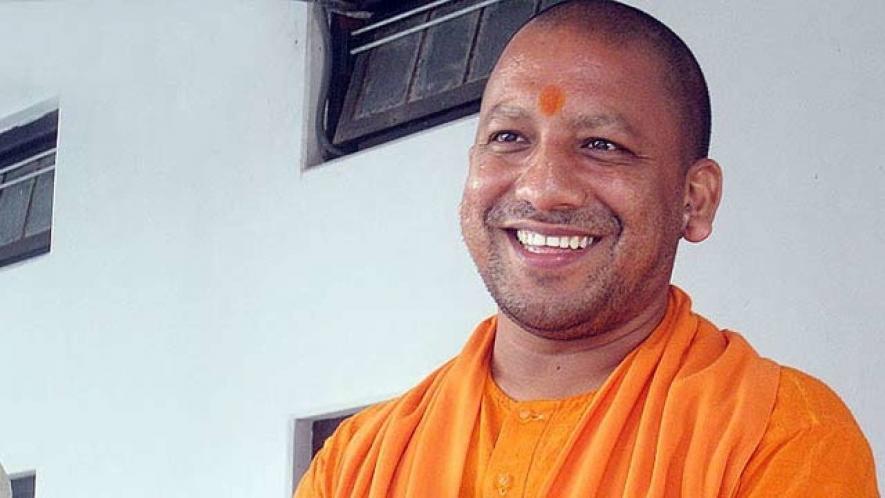Yogi Adityanath Does Not Care As Farmers Kill Themselves In Uttar Pradesh

The model of governance showcased by chief minister Yogi Adityanath in Uttar Pradesh has been characterised by an increasing number of farmer suicides and the complete absence of state intervention to prevent them.
Farmer suicides in the state have largely gone unnoticed, both by the state government and by the media, despite a substantial increase since the Adityanath-led BJP regime took over, said Ghulam Mohammad Jaula, a senior farmer activist who was a long-time comrade-in-arms of the legendary farmer leader from Uttar Pradesh, Mahendra Singh Tikait.
Jaula told Newsclick that in the past three weeks, more than half a dozen farmers committed suicide due to repeated storms and the larger agrarian crisis.
“I can give examples of more than fifty suicides and distress deaths of farmers. The point is, there is no one to take the death of farmers seriously because, at least in western Uttar Pradesh, farmers are divided in the larger caste politics,” said Jaula, who left Bharatiya Kisan Union (BKU) after it sided with rioters during the deadly 2013 communal riots in Muzaffarnagar.
Jaula formed the Bharatiya Kisan Mazdoor Manch to work on farmers’ issues. The Manch has been keeping a track of the farmer suicides in the state.
When storms struck various parts of Uttar Pradesh in April and May, they destroyed the crops of thousands of farmers, many of whom were counting on the crop for their survival.
One of these farmers was the late Bhupendra Singh, a resident of Sohalla village in Agra, who had sowed wheat on six beeghas of land, of which two beeghas were his own and the rest four beeghas were part of the batai (sharecropping) system.
According to his elder brother Neeraj, the storm which came on 11 April substantially destroyed Bhupendra’s crop. “But somehow he had managed to save whatever was unaffected from the storm. But then again another storm came on 4 May which spoiled whatever was left. That really broke Bhupendra.”
“The next night he hanged himself. We found out the same night but then it was quite late. By the time family members rushed him to the district hospital, he had died,” said Neeraj.
“He has left behind two small children and a wife. We have no idea how they will survive. The district administration is yet to get in touch with us,” he added.
Nadeem Ahmad, who works with Jaula and keeps track of the agrarian crisis in the state, said distress deaths of farmers through heart attacks were similar to suicides, or what he calls “unnatural deaths.”
“You have no idea how prone farmers are to heart attacks. They remain under tremendous stress and tension, and once it goes beyond a limit they die of heart attacks. I do not consider that as a natural death. These deaths are precipitated by the agricultural crisis which the state is not bothered about. Farmers are not responsible for their own deaths by heart attacks,” Ahmad said, giving an example of the death of Megh Singh, a resident of Accnera area in Agra, who had a fatal heart attack.
Singh’s story was similar to that of Bhupendra. His wheat crop got destroyed in the series of storms which struck the region in the past one month.
Another victim of stormy weather and continued apathy of the state government was Vedpal, a 38-year-old farmer from Nanhedi village under Badgaon police station of Saharanpur, who committed suicide on 2 May after the storm destroyed almost all of his crop spread on eight beeghas of land.
His brother Rampal told Newsclick, “He was quite tensed and distressed as he was unable to find labour to cut the crop. Then on 1 May, a huge storm destroyed a large part of his crop. Besides, he was already under huge debt, so there was the unrelenting pressure to pay back the money he owed.”
“Also, there was this news that the district administration had issued a notice to the local sugar factory for shutdown, which made many farmers worried about what is going to happen to their crops. This made Vedpal all the more anxious because that would mean all the money, energy and time he had invested in the past one year would go waste,” Rampal added.
While Adityanath visited government procurement centres many times during his visits to different parts of the state, the farmers continue to allege that these centres entertain middlemen and do not buy grains from the farmers who wait there to sell their produce.
The situation has been far from rosy even for those farmers whose crops were not destroyed by the unruly weather.
A farmer in Amethi died on 4 May after standing in queue for three days in order to sell his crop at a government procurement centre.
Forty-two-year-old Abdul Sattar came with several bags of grains to the local procurement centre in Amethi on 2 May, when he was told by the authorities that his produce will be purchased that day. He ended up waiting for the entire day and stayed over the next day in the hope that the grains will be sold. On 3 May, some of his produce was bought by the centre, which made him wait for yet another day for the rest of his crop to be sold. He stood guard over his grains on the intervening night of 3 and 4 May. On the morning of 4 May, when farmers gathered outside the procurement centre tried to wake up Sattar, he did not move at all. He was later declared dead. His death gives ballast to allegations by local farmers that the government officials at the procurement centres were not buying grains from farmers but from middlemen.
Siddha, a 68-year-old farmer from Pehra village of Hamirpur district, hanged himself on 24 April. According to his son Sitaram, Siddha had a debt of Rs 11 lakh.
“My father had taken a loan of Rs 5 lakh from the UP Gramin Bank to buy a tractor. He had paid some amount back, but due to the repeated failure of the crop and decreasing productivity, he had been unable to pay back the rest of the loan. On the morning of 24 April, we found his body hanging from the ceiling fan. He looked tense, but we did not know he would take such an extreme step,” Sitaram told Newsclick.
Hamirpur sub-divisional magistrateSP Agarwal told the media that officials had been asked to probe Siddha’s death. He said it was premature to conclude that the farmer committed suicide due to debt.
Similarly, 40-year-old Deshraj, a resident of Dahha village in Chugama area of Baghpat, hanged himself near the hand pump outside his farmland on 17 April. His brother Sompal Rana said Deshraj had left home saying he was going to water the farmland. “When he did not return, we were worried and went to the farm only to find his dead body hanging. Though he owned about 10 beeghas of land, he had taken a few lakhs from the local money lenders and there was constant pressure to pay back. But, as you know, the situation of agriculture has not been great lately. Farmers are under tremendous stress from all sides and it takes a toll on our mental states,” Rana told Newsclick.
Rana said the local officials had told him they would take action against the local money lenders if the probe found them responsible for his brother's suicide, but he was yet to hear anything from them.
Some of these suicides were pointed out by Jaula’s team, which keeps a tab on the reportage of the local vernacular media as farmer suicides rarely reach national editions of Hindi newspapers.
“What is shocking is that no one is talking about the farmers’ suicides in Uttar Pradesh,” Jaula told Newsclick.
“In the days when Mahendra Singh ji was alive, farmer suicide was a rare thing in UP. Because of the cash crop like cane, farmers were in much better conditions. But now, due to the continued apathy of the state to the agrarian crisis, not a single week passes when farmers do not commit suicide in one district or another,” added Jaula, who is in his early seventies now.
Get the latest reports & analysis with people's perspective on Protests, movements & deep analytical videos, discussions of the current affairs in your Telegram app. Subscribe to NewsClick's Telegram channel & get Real-Time updates on stories, as they get published on our website.
























